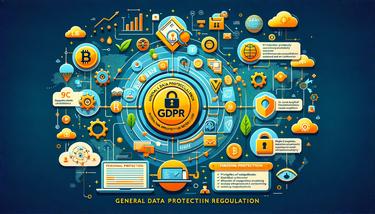GDPR
The General Data Protection[1] Regulation (GDPR) imposes obligations on organizations, including crypto companies, regarding the collection, storage, processing, and protection of personal data of EU citizens. This regulation aims to strengthen and unify data protection for all individuals within the European Union (EU) and the European Economic Area (EEA). This document outlines the GDPR obligations that crypto companies operating within or targeting customers in the EU and EEA must adhere to.
Key Facts
- Crypto companies must ensure that personal data is processed lawfully, transparently, and for a specific purpose.
- Data subjects have the right to access their personal data, correct inaccuracies, and request deletion under certain conditions.
- Crypto companies must implement appropriate technical and organizational measures to ensure a level of security appropriate to the risk.
- In case of a data breach, companies are required to notify the relevant supervisory authority and, in certain cases, the affected individuals.
- Non-compliance[2] with GDPR can result in fines of up to 4% of annual global turnover or €20 million, whichever is higher.
Understanding GDPR in Crypto
The General Data Protection Regulation (GDPR) sets stringent guidelines for the handling of personal data within the EU and EEA. For the cryptocurrency[3] sector, navigating GDPR compliance involves understanding how personal data is collected, stored, and used in crypto transactions and services.Compliance with GDPR is crucial for crypto businesses operating in or serving customers within the EU, ensuring the protection of personal information and upholding individuals’ privacy rights.
Data Protection Measures
Crypto businesses must implement robust data protection measures to comply with GDPR. This includes encrypting personal data, ensuring secure data storage and transfer, and applying privacy by design principles in the development of crypto services. Regular audits and assessments are necessary to identify and mitigate data protection risks.The appointment of a Data Protection Officer (DPO) is recommended for overseeing compliance efforts and serving as a point of contact for regulatory authorities.
Rights of Individuals
GDPR grants individuals several rights regarding their personal data, including the right to access, the right to be forgotten, and the right to data portability. Crypto businesses must establish processes to respond to individuals’ requests to exercise these rights efficiently.Clear and transparent privacy policies should be in place to inform users about their rights and how their data is handled.
Impact on Global Crypto Operations
While GDPR is an EU regulation, its impact extends globally to crypto businesses that process the personal data of EU citizens. Compliance requires not only adapting data handling practices but also ensuring that third-party service providers and partners adhere to GDPR standards.Understanding the extraterritorial scope of GDPR is essential for crypto businesses to avoid hefty fines and legal challenges.
Conclusion
GDPR compliance represents a significant challenge but also an opportunity for crypto businesses to demonstrate their commitment to data protection and privacy. By adopting comprehensive data protection measures, respecting individuals’ rights, and understanding the global implications of GDPR, crypto businesses can build trust with users and navigate the regulatory landscape[4] successfully.Staying informed about GDPR and its application within the cryptocurrency sector is key to maintaining compliance and fostering a responsible crypto ecosystem.
- Data Protection — The practices and policies that ensure the confidentiality and integrity of user data against unauthorized access and breaches.
- Compliance — The act of adhering to legal standards and regulations established by governmental bodies and regulatory agencies, particularly in the context of financial operations and transactions involving cryptocurrencies.
- Cryptocurrency — Digital or virtual currency secured by cryptography, facilitates secure, anonymous transactions.
- Regulatory Landscape — The set of laws, guidelines, and policies that govern the use of virtual assets across different regions.
- European Commission. 'Regulation (EU) 2016/679 of the European Parliament and of the Council of 27 April 2016 on the protection of natural persons with regard to the processing of personal data and on the free movement of such data (General Data Protection Regulation)'.
- Information Commissioner's Office (ICO). 'Guide to the General Data Protection Regulation (GDPR)'.
- European Data Protection Board. 'Guidelines on Data Protection by Design & Default'.

